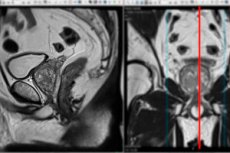New publications
Artificial intelligence is better at detecting prostate cancer on MRI than radiologists are
Last reviewed: 02.07.2025

All iLive content is medically reviewed or fact checked to ensure as much factual accuracy as possible.
We have strict sourcing guidelines and only link to reputable media sites, academic research institutions and, whenever possible, medically peer reviewed studies. Note that the numbers in parentheses ([1], [2], etc.) are clickable links to these studies.
If you feel that any of our content is inaccurate, out-of-date, or otherwise questionable, please select it and press Ctrl + Enter.

Artificial intelligence (AI) detects prostate cancer more often than radiologists. In addition, AI causes half as many false alarms. This is shown by an international study coordinated by Radboud University Medical Center and published in The Lancet Oncology. This is the first large-scale study in which an international team transparently evaluates and compares AI with radiologists’ assessments and clinical results.
Radiologists face increasing workloads as men at increased risk of prostate cancer now routinely undergo prostate MRI scans. Diagnosing prostate cancer using MRI requires significant expertise, and there is a shortage of experienced radiologists. AI can help address these issues.
Artificial intelligence expert Henkjan Hausman and radiologist Maarten de Rooy, leaders of the PI-CAI project, organised a major competition between AI teams and radiologists involving an international team. Together with other centres in the Netherlands and Norway, they provided more than 10,000 MRI scans. They transparently identified the presence of prostate cancer for each patient. Different groups around the world were allowed to develop AI to analyse these images.
The top five submissions were combined into a super algorithm to analyze MRI scans for prostate cancer. Finally, the AI scores were compared with those of a group of radiologists on four hundred prostate MRI scans.
Accurate diagnostics The PI-CAI community brought together more than two hundred AI teams and 62 radiologists from twenty countries. They compared the results of the AI and radiologists not only with each other, but also with the gold standard, tracking the results of men who had scans. On average, the men were followed for five years.
This first international study on the use of AI in prostate cancer diagnosis shows that AI detects nearly 7% more significant prostate cancers than a group of radiologists. In addition, AI identifies suspicious areas that later turn out to be non-cancerous in 50% fewer cases. This means that the number of biopsies can be halved using AI.
If these results are confirmed in subsequent studies, it could greatly benefit radiologists and patients in the future. It could reduce radiologists’ workload, provide more accurate diagnoses, and minimize unnecessary prostate biopsies. The AI developed still needs to be validated and is not yet available to patients in a clinical setting.
Quality System Hausman notes that the public mistrusts AI. “This is because manufacturers sometimes create AI that is not good enough,” he explains. He is working on two things. The first is a public and transparent test to fairly evaluate AI. The second is a quality management system, similar to what exists in the aviation industry.
"If planes almost collide, the safety committee will study how to improve the system so that it doesn't happen in the future. I want the same for AI. I want to study and develop a system that learns from every mistake so that the AI is supervised and can continue to improve. That way, we can build trust in AI in healthcare. Optimal, supervised AI can help make healthcare better and more efficient."
